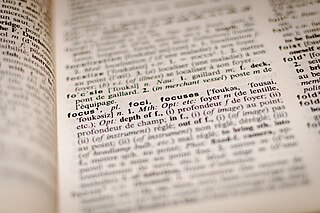
Fictionary, also known as The Dictionary Game or simply Dictionary, is a word game in which players guess the definition of an obscure word. Each round consists of one player selecting and announcing a word from the dictionary, and other players composing a fake definition for it. The definitions, as well as the correct definition, are collected blindly by the selector and read aloud, and players vote on which definition they believe to be correct. Points are awarded for correct guesses, and for having a fake definition guessed by another player.

Charades is a parlor or party word guessing game. Originally, the game was a dramatic form of literary charades: a single person would act out each syllable of a word or phrase in order, followed by the whole phrase together, while the rest of the group guessed. A variant was to have teams who acted scenes out together while the others guessed. Today, it is common to require the actors to mime their hints without using any spoken words, which requires some conventional gestures. Puns and visual puns were and remain common.
Balderdash is a board game variant of a classic parlor game known as Fictionary or "The Dictionary Game". It was created by Laura Robinson and Paul Toyne of Toronto, Ontario, Canada. The game was first released in 1984 under Canada Games. It was later picked up by a U.S company, The Games Gang, and eventually became the property of Hasbro and finally Mattel. The game has sold over 15 million copies worldwide to date. It is aimed at fans of word games, such as Scrabble.
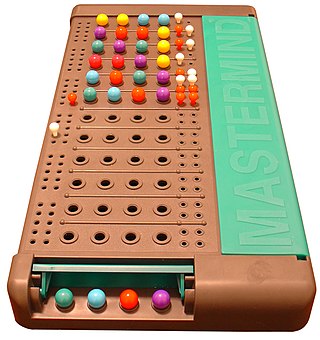
Mastermind or Master Mind is a code-breaking game for two players invented in Israel. It resembles an earlier pencil and paper game called Bulls and Cows that may date back a century.

Eye Guess was an American game show created by Bob Stewart and hosted by Bill Cullen, which aired on NBC from January 3, 1966, to September 26, 1969. The game combined a general knowledge quiz with a Concentration-style memory element, where the answers were shown to the players and their recall of their positions was tested.
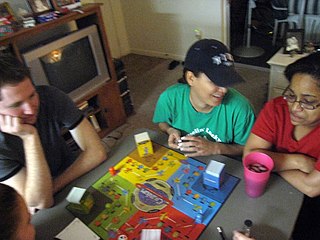
Cranium is a party game created by Whit Alexander and Richard Tait in 1998. Initially, Cranium was sold through Amazon.com and the Starbucks coffee chain, then-novel methods of distribution. After selling 44 million copies of Cranium and its sister titles, the game's manufacturer Cranium, Inc. was bought by Hasbro, Inc. for $77.5 million in 2008. Billed as "The Game for Your Whole Brain", Cranium includes a wide variety of activities, unlike many other party games. Giorgio Davanzo handles packaging and branding for the game, and the artwork is by cartoonist Gary Baseman.

Lingo is an American television game show with multiple international adaptations. In it, contestants compete to decode five-letter words given the first letter, similarly to Jotto, with each correctly guessed word earning number draws to attempt filling in a Bingo card.
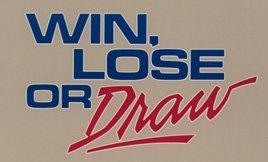
Win, Lose or Draw is an American television game show that aired from 1987 to 1990 in syndication and on NBC. It was taped at CBS Television City, often in Studios 31, 33, and 43 at various times. It was co-produced by Burt & Bert Productions and Kline & Friends for Disney's Buena Vista Television. It has also had two versions on The Disney Channel: Teen Win, Lose or Draw from 1989 to 1992, and a revived version known as Disney's Win, Lose or Draw which aired in 2014. New York described Win, Lose or Draw as "a knockoff" of the board game Pictionary.
iSketch was a drawing browser game that was similar to Pictionary. It was launched by Robert Wahlstedt on June 15, 1999, and was written in Adobe Shockwave. As of April 9, 2019, support for Adobe Shockwave was discontinued, and the game ceased to function correctly and has not been updated.

Top Secret Spies is a spy-themed German-style board game designed by Wolfgang Kramer and published in 1984 by Ravensburger. The game, also known as Under Cover or Detective & Co, won the Spiel des Jahres award in 1986.

Barbarossa is a plasticine-shaping German-style board game for 3 to 6 players, designed by Klaus Teuber in and published in 1988 by Kosmos in German and by Rio Grande Games in English. Barbarossa won the 1988 Spiel des Jahres award.

Think Fast is an American children's game show which aired on Nickelodeon from May 1, 1989, to March 30, 1990, with reruns airing weekly until June 29, 1991.

Get the Picture is an American children's game show that aired from March 18 to December 6, 1991, on Nickelodeon. Hosted by Mike O'Malley, the show features two teams answering questions and playing games for the opportunity to guess a hidden picture on a giant screen made up of 16 smaller screens. The show was taped at Nickelodeon Studios at Universal Studios in Orlando, Florida. The program's theme music and game music was composed by Dan Vitco and Mark Schultz, and produced by Schultz. Its tagline is The Great Frame Game.
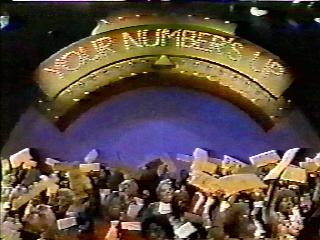
Your Number's Up is a game show that aired on NBC from September 23 to December 20, 1985. The show was hosted by Nipsey Russell with Lee Menning as co-host. Announcing duties were handled by Gene Wood for the first month and John Harlan for the rest of the run, with Johnny Haymer and Johnny Gilbert as substitutes.

Bezzerwizzer is a trivia game combining trivia, tactics and trickery. The game was invented in 2005 by the Dane Jesper Bülow. The game's name is a German term meaning "better knowing". In the game, a Bezzerwizzer is a "know-it-all", who counts on outwitting everyone else.

Lingo is a television game show that aired in the Netherlands between 1989 and 2014, and returned in 2019 on the commercial channel SBS6. Since 2022, it is aired on the commercial channel Net5. The format consists of a word game that combines Mastermind and Bingo.

Dixit, is a French card game created by Jean-Louis Roubira, illustrated by Marie Cardouat, and published by Libellud. Using a deck of cards illustrated with dreamlike images, players select cards that match a title suggested by the designated storyteller player, and attempt to guess which card the storyteller selected. The game was introduced in 2008. Dixit won the 2010 Spiel des Jahres award.
Family Game Night is an American television game show based on Hasbro's family of board games and EA's video game franchise of the same name. The show was hosted by Todd Newton. Burton Richardson was the announcer for the first two seasons; he was replaced by Stacey J. Aswad in the third season, and Andrew Kishino was hired for the fourth season. The 60-minute program debuted on October 10, 2010, on The Hub which was Discovery Kids. The network became Discovery Family on October 13, 2014; it was previewed on October 9, 2010, on its sister channel, TLC. Seasons 1 and 2 contained 26 and 30 episodes respectively. Seasons 3, 4 and 5 each contained 15 episodes. Season 2 premiered on Friday, September 2, 2011, with additional games being added. The games added to the second season included Cranium Brain Breaks, Green Scream, Ratuki Go-Round, Simon Flash, Operation Sam Dunk, Trouble Pop Quiz, and Spelling Bee. However games from the previous season were still kept.

The Jackbox Party Pack is a series of party video games developed by Jackbox Games for many different platforms on a near-annual release schedule since 2014. Each installment contains five games that are designed to be played in groups of varying sizes, including in conjunction with streaming services like Twitch which provide means for audiences to participate.

Chinese Poetry Congress is an ongoing game show on China Central Television that tests competitors' memory and reciting of Chinese poetry, including classical and modern forms of shi, ci, and qu. It is related to several other game shows, such as Chinese Characters Dictation Competition and Chinese Idioms Congress.
















